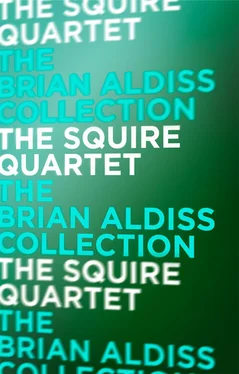It was always a good idea to test Russians out with George Orwell, whose works were banned in the Soviet Union. ‘Orwell said that even the art of writing is largely the perversion of words.’
‘I know it. But Orwell also says that the whole meaning of a word is in its slowly acquired associations, and that is untrue – or is no longer true, or not if you believe that it is the duty of those who still can to distinguish between true and false to do so continuously. One of the attractions of words these days – this I observe mostly in the West, by the way – is that they should be new, fresh, mysterious, and therefore carry thought forward. “Escalation” was a fashionable word last time I was in London. Now, even in Paris, “Trade-off” is very popular. There is also something called “The Crunch”.’
‘The Crunch is what you get from a good grissino,’ said Squire, suiting action to words as one of the fatherly waiters took his empty soup plate away, and substituted a generous helping of lasagne. ‘I seem to think that after our meeting in the Tate we had a drink in the bar.’
‘Or,’ said Rugorsky, again fixing a veiled scrutiny on Squire, to see how his remark went down, ‘to speak more precisely, several drinks. Mr Lippard-Milne became quite merry. Remind me please of the name of his attractive wife.’
‘Sheila.’
‘Ah, yes.’ Rugorsky smiled to himself. ‘Sheila.’
‘Such new words are usually generated by small groups,’ said Fittich, breaking from his own conversation in German with Krawstadt and Frenza and speaking in English across the carnations to Squire and Rugorsky. ‘So there is always a certain cachet in using such words, implying one is an insider. In consequence, they pass quickly through the social system. We live in a world of bottlenecks, chain reactions, different ballgames, and indeed “different ballgame situations”. And we are constantly hoping that things are going to gel.’
Squire explained the word ‘gel’ in French to Rugorsky. ‘A situation that has not gelled is considered to be a liquid rather like hot jelly. As it cools, it goes through a phase-change, setting into a definite form. Would you say that this conference has yet gelled?’
Rugorsky, who had turned his scrutiny on Fittich, asked the latter, ‘Excuse me, you are a philologist?’
‘I’m sorry, I do not speak French.’
‘Then I suppose I must speak in English. We have only a few days here to make ourselves understood to one another.’
As the waiters brought in steaming dishes of fish and macaroni, which Gianni Frenza said was a local speciality, Fittich observed, ‘My belief is that the cuisine is gelling into rather a success. Too much of this pasta and I may undergo a slight phase-change myself in the region of my middle.’
After the meal, the Russians excused themselves and Frenza slipped away to consult d’Exiteuil. Squire and Fittich decided to take a turn in the street; Krawstadt crossed the foyer with them and excused himself at the doors. He had no English, as Squire had no German worth mentioning.
They walked in silence along the Via Milano, or exchanged small talk about the goods on display in shop windows.
‘It must be important to you that this conference succeeds,’ said Fittich, as they waited to cross the next intersection. ‘Although I believe – or I’m given to understand – that many of the Italians are well-known in their own specialized fields, yours is the only celebrity name. I wondered why you chose to associate yourself with the proceedings.’
‘I’ve known Jacques d’Exiteuil for some years. And his wife, Séverine. That’s one answer. Another answer is that I am not an academic so, unlike the academics here, I have little at stake. Also – third reason – well, I am rather at a loss at home.’
‘I should not have thought that to be possible.’
After a silence, when they turned down a side street towards the sea, Fittich said, ‘Sorry, you may have thought I was probing. Perhaps I was. My expression of admiration over lunch for your work was not idle. I forget you probably will not know of me, since my work goes on in Germany, and is in any case not on the scale of your “Frankenstein Among the Arts”.
‘I should tell you that I am a rather old-fashioned teacher of literature at the University of Bad Neustadt, which is not all that far from Würzburg and rather too close to the frontier with the so-called German Democratic Republic.’
‘Of course I know Würzburg, and the Residenz with its beautiful Tiepolos. For that matter, I know the GDR … What literature do you teach?’
‘German and English. Mainly old-fashioned literature, before this century. But as a matter of fact I am not averse to the contemporary forms of fiction, and have held courses on the masters of crime, such as Hammett, Chandler, and Bardin, a personal favourite. I’m also devoted to science fiction, on which topic I am to deliver my paper tomorrow.’
When they were half-way down the steep little street, Squire pointed ahead.
‘There’s the Mediterranean, still looking inviting. Well, I’m looking forward to hearing your paper, though the interpreters will do their best to make sure that we all hear something other than your intention.’
‘Isn’t it awful? The German translation is terrible. Well, it isn’t even German. However, I shall do my best. You may sight a few dim landmarks here and there, through the fog. For instance, I shall have an opportunity to mention the writings of Aldous Huxley rather more favourably than was done by the American lady this morning.’
He shot Squire a quick interrogative look, a mild smile playing about his lips.
‘You could hardly speak more adversely. “Acting out prophetically the suicidal tendencies of the West …”’
‘Exactly.’ Fittich exhaled. He walked with his arms hanging relaxedly by his side.
They came to the bottom of the street and paused. Ahead, beyond a double line of traffic, were flats, walls, and then sheds, shutting them off from the Mediterranean which, from farther up the steep side road, had been visible as an inviting strip of blue.
‘The entrance to the harbour’s farther along. This is about as near as I got to the sea this morning.’
‘Oh well, we must resign ourselves,’ said Fittich, in the tone of one well-accustomed to resigning himself. ‘At least we had our sight of the sea, and a little exercise. Now I shall return happily to the hotel. I am very pleased to make your acquaintance.’
‘The next session is not until four o’clock. We could walk along this way.’
‘I wish to have a siesta, thanks all the same.’ He smiled apologetically and tugged at his neat grey sideburns.
‘Then I’ll walk back with you. I flew in rather late last night, and an hour’s snooze will help keep me awake through the afternoon papers.’
They turned, walking side by side.
After a silence, Fittich said, ‘My considered opinion is that it really requires more delicacy to form critical opinions about the popular culture of today which we find all around us than it is to deal with the illustrious dead, such as Beethoven or Goethe. One needs an open mind and a specific vocabulary.’
‘We got a lot of Marxist-Leninist vocabulary this morning, didn’t we?’
‘Are they only talking to themselves? Do they not enjoy what they speak about? Well, I shall console myself with your remark – “If you like whisky, never get a teetotaller to write about it.”’
They laughed. ‘Let’s have a whisky together this evening,’ said Squire. ‘I have to go out for an hour or two, but will be back by about ten o’clock.’
‘Fine. A great pleasure.’ They had reached the doors of the hotel. ‘I want to talk more with Vasili Rugorsky. He seemed a decent enough chap.’
Читать дальше












